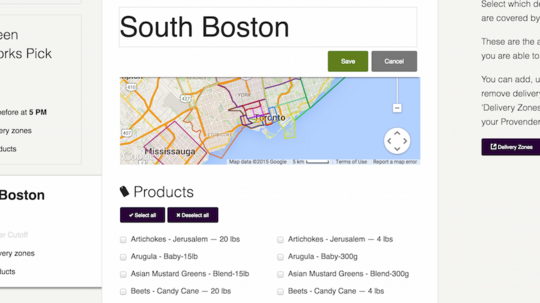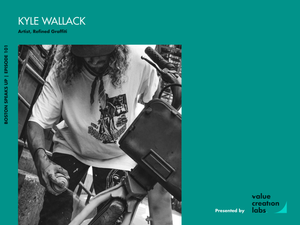
It’s no secret that our food system is, for lack of more eloquent phrasing, screwed up. Nearly everything we eat comes from a complicated supply chain: farmer to broker to wholesaler to delivery company and finally, to restaurant.
It’s problematic. Why? Primarily because dining establishments rely on the quality of their food—and that’s something that naturally suffers when it’s changing hands so many times, going through a long transportation process, and being repeatedly refrigerated and thawed along the way.
Provender, a Canadian startup that was recently accepted to Techstars Summer 2015 class, seems to have a viable solution for making farm-fresh ingredients accessible to every chef, allowing them to embrace the rising farm-to-table trend even if they don't have the luxury of scouring markets in the early morning.
Provender’s marketplace enables farmers to easily manage their inventory, and also make that information available to chefs, showing them what’s fresh today, what will be picked next week, and what they can expect in a month. That means better communication of farm data, lower search and discovery costs for buyers, and stronger relationships between farmers and dining establishments. And it’s free for both farms and chefs to access.
“There’s just never been a centralized place where the producers could access the same type of market that the distributors and large wholesalers had,” said VP of sales and business development Adam Bent in an interview with BostInno. “So by allowing them to adopt our platform, which offers the same benefits and features a distributor offers, they can then run their business at the same level.”
Innovating an antiquated system
Unsurprisingly, the company was founded in 2013 by people who understand firsthand the inefficiencies of this industry. Cofounder and CEO Cai Rintoul worked as a chef for many years, managed a farmers market startup, and worked on the product side for a startup doing rooftop greenhouses. CTO Jeff Aldridge, who is leading product development, grew up on a third-generation dairy farm in Minnesota. Cofounder Kyra Kristof has been a community curator for Pollin8r, a collaborative fellowship that supports food system innovators. Bent has a strong background in hospitality and travel, and was previously Urbanspoon’s Canadian sales manager (as well as the first employee hired to represent Urbanspoon in the launch of the Canadian market).
Even armed with that kind of insider knowledge, though, the Provender team had to do some serious groundwork to bring their idea to fruition. That meant researching upwards of 120 farms, and identifying the gaps producers were facing that were hindering their ability to compete with big business wholesalers and distributors—the ultimate goal being to connect them to more new buyers.
To start, Provender only included fruit and vegetables, making it a hyper seasonal marketplace. But it quickly became clear that they would need to expand beyond produce, particularly considering the cold Canadian winters. The agtech startup eventually began with working with livestock farms, fish markets, dairies, and in-house greenhouses. Now, Provender features products across every vertical and agriculture, ranging from beans, spices and nuts to artisanal items like oils, honeys, syrups and breads. The site is divided by category, but there’s also a section for current staff favorites. Users can search by food keyword or farm name. And as they’re perusing the products, they’ll see the price as well as pictures and other details, like tasting notes.
Just under two years into establishing the business, Provender has amassed 1,500 users across both Canadian markets. At any given time, there are roughly 800 products in the Quebec marketplace, and 500 in Toronto. The goal is is to have 400-500 products in the Boston marketplace by September. Already, the startup has been in talks with several nonprofits, the forthcoming Boston Public Market, and local farms, including Siena Farms in Sudbury.
Right now, logistics remains the biggest challenge in Provender’s business. According to Bent, many producers want to be able to deliver direct, but many do—and there are numerous advantages to doing so.
“On a human to human level it’s great for them to develop relationships with the chef, because it allows them to do things like discuss what’s going to be planted for the next season in advance, which can result in a lot less food waste.”
Provender may be still in its early stages, but its mission is crystal clear—and that is to make the food supply system smarter.
“We created this database and delivery tool so we can get this bird's eye view of all the moving parts from the different farms coming into the Boston area,” Bent explained. “As we see all these various delivery routes, we get a good handle on what available space might be on that truck and then we strategically onboard other producers that are along that same delivery route.”
That’s mutually beneficial: The farmer is able to pick up products from other farms on their way into the city, creating an additional revenue for themselves by offering their space as a logistics partners. And those farmers that don’t want to deliver still get the price they’re requesting for their products, sharing some of those profits with the farm from their community.
Iterating for a local food revolution
“There’s been an amazing transformation in Boston ... local food is resonating as something that’s important. People finally understand the economic value, in addition to the community building impact that it has.”
Over the past few weeks, Bent has had numerous conversations with local food industry people. And what he’s determined from his time here thus far is that Boston is experiencing a surge in development across the restaurant and culinary culture over the past five years that closely resembles what Montreal and Toronto went through on a similar timeline. Just look to restaurants like Townsman, Alden & Harlow, Sarma, Harvest, and Journeyman for proof.
“There’s been an amazing transformation in Boston,” Bent told me. “Not just in terms of awareness of the value in local food, but also the way that chefs are influencing the behaviors of consumers. So with that strengthening of the restaurant culture here, it’s started to trickle down to the community where local food is resonating as something that’s important. People finally understand the economic value, in addition to the community building impact that it has.”
Recently, Bent has noticed a shift — producers are moving all of their wholesale business onto the Provender platform and using it as their sales management tool.
“That’s informed our main priority going forward,” he added. “Provender certainly takes care of our chefs. Now, our real focus is to build a tool that’s powerful for farmers.”
Images provided by Provender.








